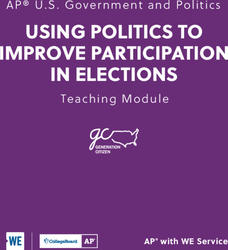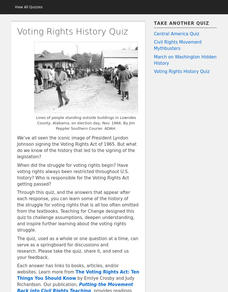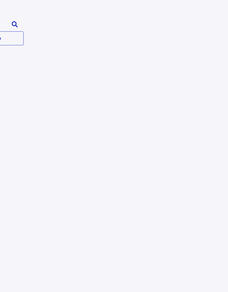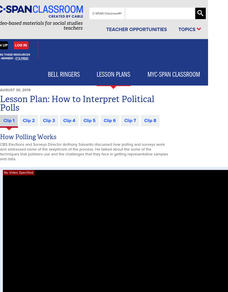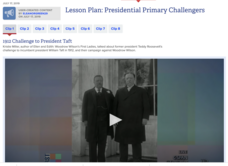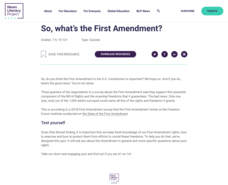College Board
Using Politics to Improve Participation in Elections
Instructors new to teaching AP U.S. Government and Politics classes, as well as seasoned veterans, will find this teaching guide an invaluable resource. Using a project-based approach to civics education, the lessons emphasize real-world...
Teaching for Change
Voting Rights History Quiz
An 11-question online quiz permits young historians to check their knowledge of the history of voting rights in the United States. After reading a short introduction, individuals click through the questions that test their knowledge of...
PBS
PBS Electoral Decoder
Imagine being able to explore all the presidential elections from 1789-2016! Being able to examine the key events, how the states voted, and the importance of the Electoral College in each of the elections! A PBS cartogram makes all this...
Learning to Give
Deliver Gratitude Day
Gratitude is the focus of a discussion that sets the stage for pupils to take part in a service-learning project in which they deliver notes of kindness by way of social media or mail. A reflection closes the learning experience.
Facing History and Ourselves
Literature and Imagination Make Democracy Work
The final lesson in the "What Makes Democracy Work?" series examines the connections between imagination, literature, and democracy. Class members listen to a podcast, read an excerpt from Azar Nafisi's, The Republic of Imagination, and...
Facing History and Ourselves
Reflection and Action for Civic Participation
Slacktivist or activist? Bystander or upstander? Positive social change requires involvement and commitment. After reading a series of articles about young people who chose to get involved, scholars examine a framework that helps peers...
Facing History and Ourselves
Responding to Difference in Democracy
Disagreements happen in a diverse democracy. It's what people do about these differences in a diverse society that the resource models. After listening to an eight-minute podcast about a woman who collaborated with people who have very...
Facing History and Ourselves
Taking Ownership of the Law
The work of building and maintaining a democracy is, in the words of Justice William Hastie, "never finished." To better understand what Hastie sees as an ongoing building process, class members listen to a seven-minute podcast about two...
Facing History and Ourselves
Insights on Democracy from South Africa
As part of their study of democracy, high schoolers listen to a podcast featuring two South African educators and their efforts to support the process of transforming the nation from apartheid rule into a democracy. Learners also read...
Facing History and Ourselves
Citizen Power Makes Democracy Work
Eric Liu's formula "power plus character equals citizenship" and his three strategies to making change happen model for high schoolers how to develop citizen power, how to get involved and participate to make democracy work. Class...
Facing History and Ourselves
Defining Democracy
For democracies, it is both the best and the worst of times. As part of a study of the challenges facing democracies, young political scientists seek first to define democracy, and then to consider the relationship between democracy and...
Facing History and Ourselves
Free Press Makes Democracy Work
A unit study of the importance of a free press in a democracy begins with class members listening to a podcast featuring two journalists, one from a United States public radio station and one from Capetown, South Africa. The...
Facing History and Ourselves
The Legacies of Reconstruction
The final lesson in the seven-resource Reconstruction Era collection examines the legacies of Reconstruction. Class members investigate why the period has been called an "unfinished revolution," "a splendid failure," and "the second...
Facing History and Ourselves
A Contested History
Memories of and interpretations of history change—that's the key takeaway from a lesson that has young historians compare the story of the Reconstruction Era as told by the historians of the Dunning School to the view of scholars today...
Facing History and Ourselves
Violence and Backlash
Revolution and counterrevolution. Protest and counter-protest. Collaborators and bystanders. The focus of the fifth resource in the Reconstruction Era and Fragility of Democracy series is on the political violence that followed Radical...
Facing History and Ourselves
Interracial Democracy
Radical Reconstruction, the 10-year period referred to after Congress passed the Reconstruction Act of 1867, saw the establishment of manhood suffrage, men voting without any racial qualifications. Southern states also rewrote their...
C-SPAN
How to Interpret Political Polls
While numbers don't lie, the reliability of information in a poll may be difficult to discern. After viewing video clips with polling experts, young scholars consider how polls work and the elements of a reliable poll. Extension...
C-SPAN
Big Data and Politics
Movie selection means more than entertainment. Learners consider what information Netflix gathers to understand the concept of "big data." Resource includes clips of experts talking about corporations that harvest the details of our...
C-SPAN
Survey Analysis- Public Perceptions of Voting and Elections
The perception of fairness in elections becomes more important with each passing election. Using data from a C-SPAN poll, budding historians consider the differences between how people perceive elections. The resource includes videos of...
C-SPAN
Presidential Primary Challengers
A formidable opponent can shake up the election of an incumbent president. Class members explore the results of the elections of 1912, 1968, 1976, 1980 and 1992 using video clips. A chart helps pupils organize their thoughts and analysis.
C-SPAN
Presidential Candidate Firsts
Hilary Clinton may have been the first woman to run for president on a major party ticket, but she was only one example of an historic candidacy. Class members use video clips curated from C-SPAN to examine historical firsts in...
News Literacy Project
So, What’s the First Amendment?
The First Amendment to the US Constitution protects people's rights to speech, the press, and religion. Using the resource, scholars discover how. They take a brief online quiz to determine how well they understand the First Amendment.
College Board
Balance of Power Between Congress and the President
Three branches of government help create a system of checks and balances. A helpful resource provides a series of articles regarding the balance of power between the legislative and executive branches of government. Historians answer...
College Board
Civic Knowledge and Action in AP U.S. Government and Politics
Vote, it's your civic duty! The high school lesson focuses on voter turnout and civic participation with a series of activities. Young scholars analyze data to discover voter turnout trends, complete worksheets, and participate in group...


